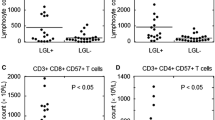Abstract
It is well known that the second-generation tyrosine kinase inhibitor dasatinib evokes an immunological reaction as an off-target effect and induces large granular lymphocytes (LGLs) expansion in 30% of patients. However, LGLs expansion in nilotinib-treated patients is rare. We report the case of a 65-year-old patient with Philadelphia chromosome (Ph)-positive acute lymphoblastic leukemia (ALL) who showed LGLs expansion during nilotinib treatment. The patient achieved complete remission (CR) after multi-agent chemotherapy combined with dasatinib treatment. However, ALL relapsed in the central nervous system and bone marrow when treatment was interrupted due to interstitial pneumonia. Nilotinib treatment was subsequently started and the patient achieved second CR. Marked peripheral blood lymphocytosis emerged after the start of nilotinib treatment. CD8 + CD57 + cytotoxic T cells were predominantly expanded and showed strong cytocidal activity against K562 Ph-positive leukemia cells. These results suggest that similar to dasatinib, nilotinib can induce LGLs expansion, possibly contributing to long-term remission in patients with Ph-ALL.




Similar content being viewed by others
References
Yilmaz M, Kantarjian H, Ravandi-Kashani F, Short NJ, Jabbour E. Philadelphia chromosome-positive acute lymphoblastic leukemia in adults: current treatments and future perspectives. Clin Adv Hematol Oncol. 2018;16(3):216–23.
Hochhaus A, Larson RA, Guilhot F, Radich JP, Branford S, Hughes TP, et al. Long-term outcomes of imatinib treatment for chronic myeloid leukemia. N Engl J Med. 2017;376(10):917–27.
Kim DY, Joo YD, Lim SN, Kim SD, Lee JH, Lee JH, et al. Nilotinib combined with multiagent chemotherapy for newly diagnosed Philadelphia-positive acute lymphoblastic leukemia. Blood. 2015;126(6):746–56.
O'Dwyer ME, Swords R, Nagler A, McMullin MF, le Coutre PD, Langabeer SE, et al. Nilotinib 300 mg BID as frontline treatment of CML: prospective analysis of the Xpert BCR-ABL monitor system and significance of 3-month molecular response. Leuk Res. 2014;38(3):310–5.
Koren-Michowitz M, le Coutre P, Duyster J, Scheid C, Panayiotidis P, Prejzner W, et al. Activity and tolerability of nilotinib: a retrospective multicenter analysis of chronic myeloid leukemia patients who are imatinib resistant or intolerant. Cancer. 2010;116(19):4564–72.
El Fakih R, Jabbour E, Ravandi F, Hassanein M, Anjum F, Ahmed S, et al. Current paradigms in the management of Philadelphia chromosome positive acute lymphoblastic leukemia in adults. Am J Hematol. 2018;93(2):286–95.
Sekimizu M, Yamashita Y, Ueki H, Akita N, Hattori H, Maeda N, et al. Nilotinib monotherapy induced complete remission in pediatric Philadelphia chromosome-positive acute lymphoblastic leukemia resistant to imatinib and dasatinib. Leuk Lymphoma. 2014;55(7):1652–3.
Tojo A, Usuki K, Urabe A, Maeda Y, Kobayashi Y, Jinnai I, et al. A Phase I/II study of nilotinib in Japanese patients with imatinib-resistant or -intolerant Ph+ CML or relapsed/refractory Ph+ ALL. Int J Hematol. 2009;89(5):679–88.
Mustjoki S, Ekblom M, Arstila TP, Dybedal I, Epling-Burnette PK, Guilhot F, et al. Clonal expansion of T/NK-cells during tyrosine kinase inhibitor dasatinib therapy. Leukemia. 2009;23(8):1398–405.
Kim DH, -Reid S, Chang H, Sutherland R, Jung CW, Kim HJ, et al. Natural killer or natural killer/T cell lineage large granular lymphocytosis associated with dasatinib therapy for Philadelphia chromosome positive leukemia. Haematologica. 2009;94(1):135–9.
Kreutzman A, Juvonen V, Kairisto V, Ekblom M, Stenke L, Seggewiss R, et al. Mono/oligoclonal T and NK cells are common in chronic myeloid leukemia patients at diagnosis and expand during dasatinib therapy. Blood. 2010;116(5):772–82.
Nagata Y, Ohashi K, Fukuda S, Kamata N, Akiyama H, Sakamaki H. Clinical features of dasatinib-induced large granular lymphocytosis and pleural effusion. Int J Hematol. 2010;91(5):799–807.
Friberg DD, Bryant JL, Whiteside TL. Measurements of natural killer (NK) activity and NK-cell quantification. Methods. 1996;9(2):316–26.
Kantarjian H, Giles F, Wunderle L, Bhalla K, O'Brien S, Wassmann B, et al. Nilotinib in imatinib-resistant CML and Philadelphia chromosome-positive ALL. N Engl J Med. 2006;354(24):2542–51.
Gruber F, Mustjoki S, Porkka K. Impact of tyrosine kinase inhibitors on patient outcomes in Philadelphia chromosome-positive acute lymphoblastic leukaemia. Br J Haematol. 2009;145(5):581–97.
Steegmann JL, Cervantes F, le Coutre P, Porkka K, Saglio G. Off-target effects of BCR-ABL1 inhibitors and their potential long-term implications in patients with chronic myeloid leukemia. Leuk Lymphoma. 2012;53(12):2351–61.
Mustjoki S, Auvinen K, Kreutzman A, Rousselot P, Hernesniemi S, Melo T, et al. Rapid mobilization of cytotoxic lymphocytes induced by dasatinib therapy. Leukemia. 2013;27(4):914–24.
Hayashi Y, Nakamae H, Katayama T, Nakane T, Koh H, Nakamae M, et al. Different immunoprofiles in patients with chronic myeloid leukemia treated with imatinib, nilotinib or dasatinib. Leuk Lymphoma. 2012;53(6):1084–9.
Powers JJ, Dubovsky JA, Epling-Burnette PK, Moscinski L, Zhang L, Mustjoki S, et al. A molecular and functional analysis of large granular lymphocyte expansions in patients with chronic myelogenous leukemia treated with tyrosine kinase inhibitors. Leuk Lymphoma. 2011;52(4):668–79.
Kreutzman A, Ladell K, Koechel C, Gostick E, Ekblom M, Stenke L, et al. Expansion of highly differentiated CD8+ T-cells or NK-cells in patients treated with dasatinib is associated with cytomegalovirus reactivation. Leukemia. 2011;25(10):1587–97.
Brenchley JM, Karandikar NJ, Betts MR, Ambrozak DR, Hill BJ, Crotty LE, et al. Expression of CD57 defines replicative senescence and antigen-induced apoptotic death of CD8+ T cells. Blood. 2003;101(7):2711–20.
Watanabe N, Takaku T, Takeda K, Shirane S, Toyota T, Koike M, et al. Dasatinib-induced anti-leukemia cellular immunity through a novel subset of CD57 positive helper/cytotoxic CD4 T cells in chronic myelogenous leukemia patients. Int J Hematol. 2018;108(6):588–97.
Fei F, Yu Y, Schmitt A, Rojewski MT, Chen B, Gotz M, et al. Dasatinib inhibits the proliferation and function of CD4+CD25+ regulatory T cells. Br J Haematol. 2009;144(2):195–205.
Blake SJ, Lyons AB, Hughes TP. Nilotinib inhibits the Src-family kinase LCK and T-cell function in vitro. J Cell Mol Med. 2009;13(3):599–601.
Author information
Authors and Affiliations
Corresponding author
Ethics declarations
Conflicts of interest
The authors declare that they have no conflicts of interest.
Additional information
Publisher's Note
Springer Nature remains neutral with regard to jurisdictional claims in published maps and institutional affiliations.
About this article
Cite this article
Hagihara, M., Hua, J., Inoue, M. et al. Nilotinib treatment induced large granular lymphocyte expansion and maintenance of longitudinal remission in a Philadelphia chromosome-positive acute lymphoblastic leukemia. Int J Hematol 111, 719–723 (2020). https://doi.org/10.1007/s12185-019-02789-6
Received:
Revised:
Accepted:
Published:
Issue Date:
DOI: https://doi.org/10.1007/s12185-019-02789-6




